Mortgage & Finance in Atlanta, GA: What You Need to Know
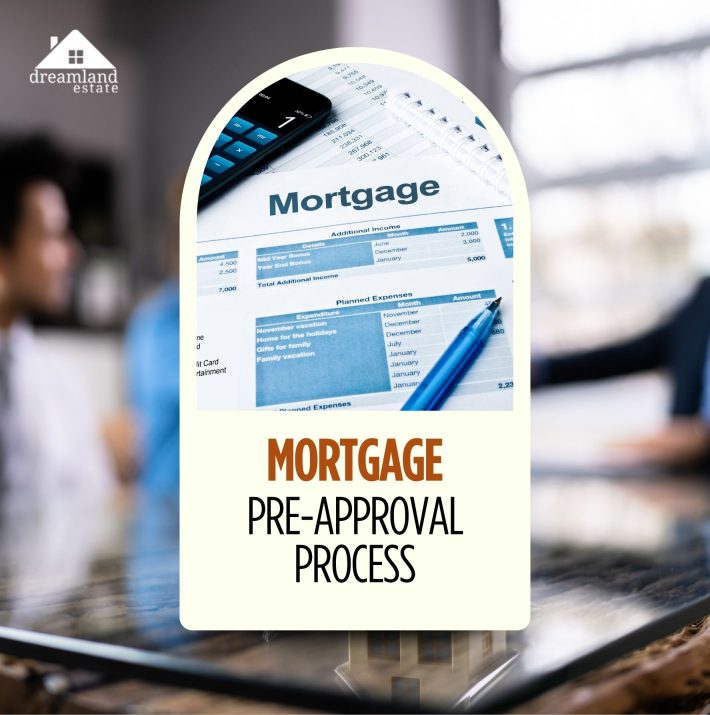
If you are planning to buy a home in Atlanta, Georgia, I bet it will be the most meaningful financial decision you make.
However, mortgages and financing are two of the most intimidating topics that come with it! These can make buying a house much more difficult if you don’t understand how it works!
There are certain factors, such as fluctuating interest rates, rising home prices, and a very competitive housing market, that make it very difficult to know where to even start!
Thus, in this blog, I will help you understand the mortgage pre-approval process. Trust me! This is going to be a huge game-changer for you. Understanding this process will help you to take your first real step towards dreaming of a home and holding the keys.
A Step-by-Step Guide to Mortgages and Finance for First-Time Homebuyers in Atlanta, GA
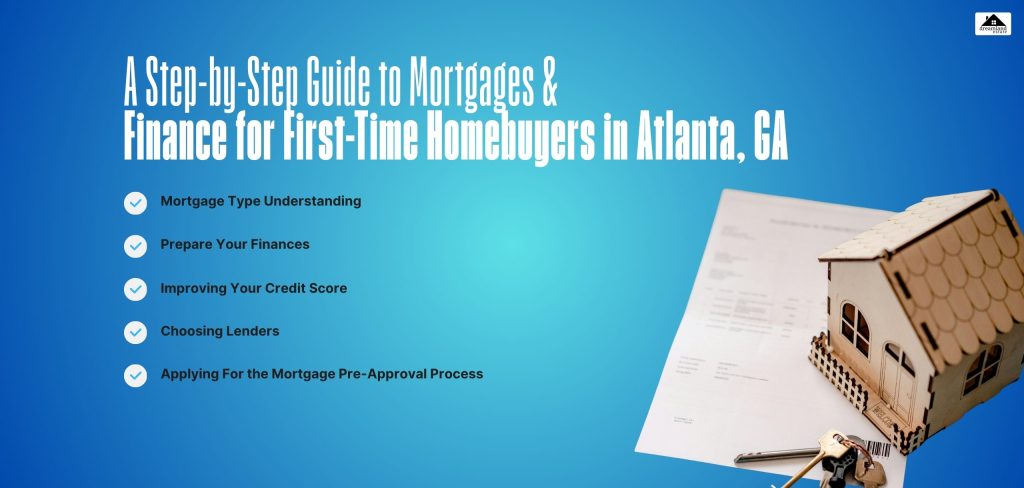
Buying your first home can be really exciting. And yet! It comes with many moving parts. Here in this section, I will walk you through the steps to get my mortgage pre-approval in Atlanta, Georgia.
This will help you approach the journey fully informed.
1. Mortgage Type Understanding
Before you apply for any mortgage, you have to understand the different types. Each type caters to other buyers. So, choose your mortgage as per your requirements.
- Fixed-rate mortgage: This specific mortgage type can provide you with steady monthly payments for the lifetime of your loan. Great for long-term homeowners who plan to stay put.
- Adjustable-rate mortgage (ARM): This starts with a lower interest rate that changes over time.
Best for short-term homeowners or those who will receive significant income increases in the near future.
- FHA Loans: They are popular with first-time buyers since they allow smaller down payments and lower credit scores. FHA loans are especially common across Atlanta’s urban and suburban areas where affordability programs are active.
- VA loans: VA Loans are for veterans, military members, and eligible spouses, offering unrivaled benefits of no down payment and no PMI.
- USDA Loans: For buyers in rural and suburban areas. Certain areas in Atlanta’s metro fringe could be eligible.
- Conventional loans: These are non-government-backed loans that tend to favor borrowers with stronger financial profiles and carry flexibility in terms and rates.
Understanding each loan will help you match the product to your needs, whether for affordability, flexibility, or long-term savings.
2. Prepare Your Finances
Before you start filling out mortgage applications, do some financial housekeeping.
- Determine your debt-to-income ratio: It’s the proportion of your monthly income that goes toward paying debts, ideally below 43%.
- Build your savings: Down payments range from 3.5% (FHA) to 20% (conventional). Add in closing costs, which are usually 2–5% of the loan amount.
- Stabilize your income: Lenders like to see a consistent income history. Avoid any job changes before applying.
If you’re self-employed in the growing gig economy in Atlanta, prepare supplemental documents, such as 2 years of tax returns or profit-and-loss statements.
3. Improving Your Credit Score
Your credit score directly affects whether you’ll get approved and what interest rate you’ll pay. In a nutshell, it controls the cost of borrowing.
How to fortify it:
- Review your credit reports from all three bureaus for any errors and dispute them.
- Pay down revolving debt to lower credit utilization.
- Avoid new loans or making credit card inquiries right before applying.
- Maintain on-time payments for at least six months to show consistent creditworthiness.
In Atlanta, many buyers qualify for FHA loans with scores as low as 580, while conventional loans usually require 620 or higher.
4. Choosing Lenders
For different needs, Atlanta has a blend of lenders, from large national institutions to neighborhood credit unions.
When comparing lenders, look not only at interest rates but also at reputation, responsiveness, customer service, and local expertise.
Atlanta-based institutions like Delta Community Credit Union and Atlanta Postal Credit Union often offer programs not available from national lenders, such as flexible underwriting for modest incomes.
Consider also CDFIs like ANDP Loan Fund, which support underbanked applicants and foster equal opportunities for homeownership in Metro Atlanta.
5. Applying For the Mortgage Pre-Approval Process
Pre-approval means the lender has issued an official statement that estimates how much you can borrow, based on verified financial data. It’s stronger than prequalification and shows home sellers that you’re ready to move.
During pre-approval, the lenders will check your job stability, credit history, assets, and debts.
They will give you a mortgage pre-approval letter that states the maximum approved amount, the estimated interest rate, and the type of loan. This usually stays valid for 60-90 days.
mortgage pre-approval process will also increase your bargaining power and narrow your home search to realistic price points.
Understanding Mortgage Basics in Atlanta

Local factors, such as property taxes and insurance, and rapid market growth, have a great impact on the mortgage scene in Atlanta.
Currently, property values in Fulton and DeKalb counties are among the fastest-growing in Georgia, which increases monthly escrow payments.
Before you decide on a mortgage, play around with Atlanta-based calculators or talk to lenders who can break down the payments by ZIP code, because the difference between Sandy Springs and South Fulton can be stark.
How to Compare Mortgage Products: FHA vs. VA vs. Conventional
Choosing your loan type can save you thousands over the life of the loan. The table below compares three popular mortgage types for Atlanta buyers:
| Feature | FHA Loan | VA Loan | Conventional Loan |
|---|---|---|---|
| Eligibility | All qualified borrowers, esp. first-time or lower-credit | Eligible U.S. military/veterans | All qualified buyers |
| Credit Score | 580+ for 3.5% down; some lenders 500+ with 10% down | No minimum, lenders prefer 620+ | Minimum 620, 680+ for best rates |
| Down Payment | 3.5% (580+ score) or 10% (500-579 score) | Often, no down payment with full entitlement | 3% first-time, 5% others |
| Mortgage Insurance | Upfront + monthly MIP, lasts for life (unless 10% down) | No monthly PMI, one-time VA Funding Fee | PMI if <20% down, cancelable at 20% equity |
| Loan Limits | County limits, e.g., $598,300 in Atlanta | No limits with full entitlement | $806,500 baseline limit in 2025 |
| Property Requirements | Must meet FHA standards | Must meet VA standards | Less strict than the FHA and the VA |
| Debt-to-Income | Up to 50% | No max, lenders prefer <41% | Prefer 36%, up to 45% with strong qualifications |
Pro tip: Always evaluate APR, not interest rate, to understand the true cost of loans that may come with fees.
Which Loan Type Is Right For You?
To decide which loan is best for your purchase in Atlanta, consider the following:
- Best for veterans: If you are an eligible veteran, a VA loan is often the most cost-effective choice. It offers the best terms, including no down payment and no monthly mortgage insurance.
- Best for borrowers with lower credit: An FHA loan is typically the better option if you have a credit score between 580 and 620, as it provides more flexible credit requirements.
- Best for borrowers with good credit: A conventional loan is more advantageous if you have a good credit score (680+) and can make a larger down payment (20% or more), as this allows you to avoid costly mortgage insurance
Here Are Some Real-World Scenarios
Scenario 1: Nicole is a tech worker in Midtown who buys her first condo in the neighborhood with an FHA loan and only 3.5% down, even with a credit score of 590.
Scenario 2: James is a veteran in Marietta using a VA loan with a down payment, no PMI, and highly favorable terms.
Scenario 3: Lisa and Tyrone in Decatur put 20% down and select a conventional loan so they will not have to pay mortgage insurance.
Tips for Choosing the Right Mortgage

Check your credit score. The higher it is, usually above 700! The better the interest rate you’ll get. Check your credit report before applying and improve it by reducing your debt burden.
Secondly, you have to stabilize your income! Lenders prefer predictable, steady income. If you are self-employed, prepare tax returns and income statements.
Thirdly, you must determine your debt-to-income (DTI) ratio. Most lenders prefer it to be at or below 43%. This compares the monthly debt payments to your gross monthly income.
So, in short?
- Check your credit score.
- Stabilize your income
- Determine your debt-to-income (DTI) ratio
Understand your loan options
First, you have the Government-backed programs! If you are eligible, consider FHA, VA, or USDA loans, as they usually have lower down payments and more lenient credit requirements.
Next comes choosing the right loan term. You have to determine whether a 15-year or 30-year term fits your budget.
A shorter term involves bigger monthly payments but lower total interest paid. A longer term provides smaller payments, but over time, you pay more in interest.
Lastly, you have to compare fixed and adjustable rates: A fixed-rate mortgage provides a predictable monthly payment, which is perfect for long-term ownership!
While an ARM has a lower starting rate that may change over time, this might be suitable for those who are going to move or refinance sooner.
Compare costs and consult professionals!
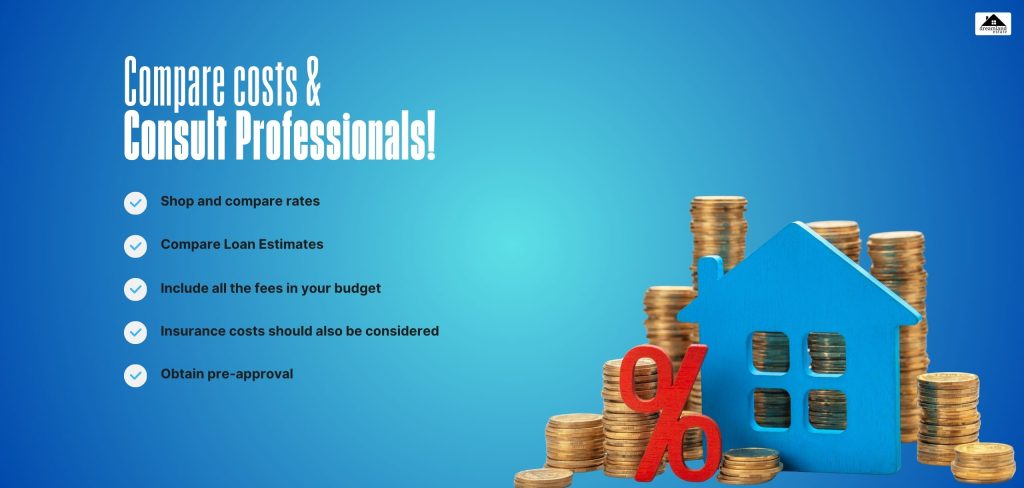
Shop and compare rates: Before you decide on the best interest rate and terms, obtain quotes from different lenders, banks, and brokers.
Compare Loan Estimates: The moment you fill out an application, it is a good idea to take each lender’s Loan Estimates and compare ther. Don’t forget that you can also indicate fees and closing costs.
Include all the fees in your budget: It is better to know all the charges that come with the deal, such as a
- Loan origination fee,
- Appraisal fee,
- Prepayment penalty if undergone.
Insurance costs should also be considered: You wil, in all likelihood, need to carry Private Mortgage Insurance if you put less than 20% down with a standard loan.
Obtain pre-approval: Although it is more verified, thus giving you an advantage, a pre-approval is not a guarantee.
Steps To Get Mortgage Pre-Approval In Atlanta, Georgia: A Checklist To Keep Handy
Keep an eye on your credit score: In general, lenders located in Georgia and other parts of the US prefer higher credit scores.
Before you submit an application, you need to check your credit report, correct the mistakes, and raise your score. This will ensure you get a lower interest rate.
Prepare a budget for yourself: The prices of the houses in Atlanta differ a lot from one district to another.
Figure out how much money you would be able to spend without any difficulties, taking into account your income, expenses, and the housing costs in Atlanta.
Collect your financial records: Get ready for the application process by having all the necessary documents, such as
- Recent pay stubs,
- Tax returns (W-2s or business returns),
- Bank statements, and
- Proof of other assets, at hand.
This will make your application process faster and easier.
Research and mortgage pre-approval process
Shop for lenders: Choose the best rates and service from local and national lenders in the Atlanta area. By means of their Loan Estimates, you can readily contrast the deals.
Get pre-approved: It would be best if you got a pre-approval letter for mortgage pre-approval process from a lender. A seller will be convinced that you are a serious buyer when you present this letter to them, and thereby will give you a better position in the Atlanta market.
Compare loan types: Learn the differences of loan types such as Conventional, FHA, VA, and USDA to make a good choice that fits your financial situation.
For instance, an FHA loan has low credit score requirements but requires payment of mortgage insurance premiums during the life of the loan.
Atlanta-specific considerations
Research local assistance programs: Several city- and state-specific programs are available for down payment and closing cost assistance. Some examples are:
Georgia Dream Homeownership Program: The program allows first-time homebuyers who meet income requirements to receive assistance up to $10,000. Besides that, eligible public service workers and the military may receive higher amounts.
Invest Atlanta Programs: They may provide up to $20,000 in forgivable loans toward the down payment and closing costs, in addition to other loan types.
Atlanta Affordable Homeownership Program (AAHOP): Through AAHOP, Inc., a non-profit community investment organization, you may receive up to $20,000 to use towards your closing costs and/or down payment that will be forgiven over either 5 or 10 years.
Choose a knowledgeable agent: You may want to hire a real estate agent in Atlanta who has expertise in specific neighborhoods, market trends, and local processes.
Budget for Closing Costs: Closing costs vary by state and loan type. A “Security Deed” is the name of the instrument in Georgia that is used to secure a property debt. Your lender will issue a Loan Estimate that will describe these charges.
Addressing the Racial Disparities of Mortgage Access
Despite being a city of opportunity, mortgage access in Atlanta is still characterized by inequity.
Researches by the Atlanta Fed and WABE illustrate that Black and Hispanic applicants experience higher rates of denial even if their financial credentials are similar to those of other applicants.
On one hand, biased underwriting systems and inefficient banking processes are the main causes of the problem! On the other hand, community-based lenders, minority brokerages, and CDFIs are not sitting idly!
But rather, we are trying to change the story by promoting transparency and financial literacy.
If you encounter inconsistencies or mistreatment, you should definitely contact organizations such as the National Fair Housing Alliance and Metro Fair Housing Services of Atlanta.
Understanding Delinquency Trends in the Mortgage Market of Atlanta
Going through financial hardships is not limited to the time before buying a house. Delinquency rates in Georgia have been on the rise lately, according to recent data, due to property tax increases and insurance hikes. The burdens of home ownership are falling to those borrowers who have managed to stay up to date during the pandemic.
- To put a shield on yourself from such situations, you should:
- Create an automatic escrow tracking with your mortgage servicer.
- If you find yourself in a situation of distress, you should first apply for loan modification programs and then wait 30 days before becoming late.
- Seek help from HUD-certified counselors who will give you free and confidential advice.
Taking the first step will determine whether a momentary issue becomes financial trouble down the road.
What Are Alternative Lending Options?
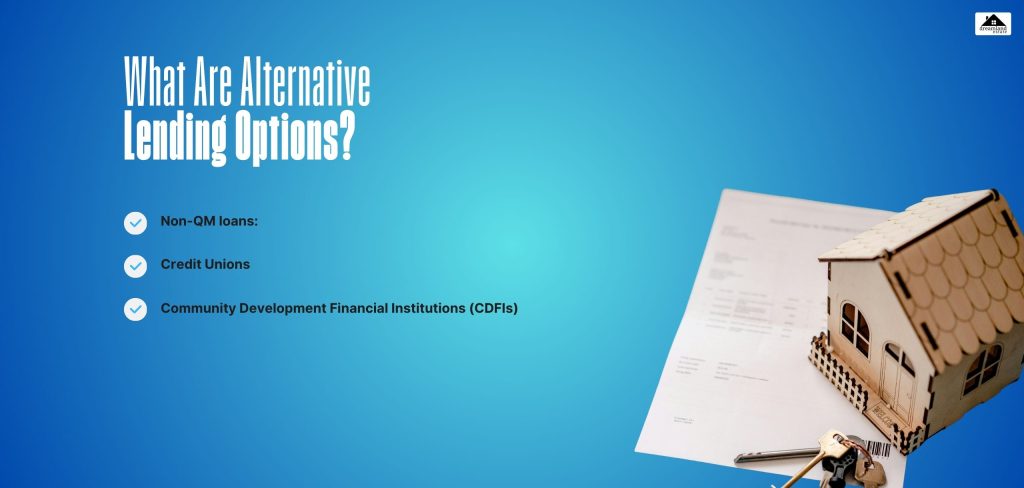
By innovating in lending, more and more people from Atlanta with diverse backgrounds and skills are entering the workforce.
- Non-QM loans: a perfect solution for freelancers and self-employed buyers who do not have W-2 income.
- Credit Unions: They give consumers lower rates, personal assistance, and profit-sharing advantages.
- Community Development Financial Institutions (CDFIs): The focus is on the most vulnerable borrowers who are usually underwritten with relaxed standards or offered smaller loans for affordable homes.
These lending options may be why gig workers and entrepreneurs can finally transition from renting to owning.
Local Housing Trust Funds and Advocacy Efforts
Local housing policies in Atlanta have been designed to keep housing affordable over time. Housing trust funds, such as the one funded by Enterprise Community Partners, allocate the money.
This money is mainly coming from both public and private sources to support down payment assistance, home repairs, and the creation of affordable housing.
Atlanta Volunteer Lawyers Foundation and Georgia ACT are advocacy groups that work to implement policies.
They use their activities and initiatives, which create more lending opportunities for the unbanked and make it easier for newcomers to enter the market for their first home.
Using Interactive Tools for Mortgage Planning
The use of technology can help avoid mistakes during the mortgage journey. Local lenders in Atlanta are now equipped with:
- Rate comparison calculators that factor in local taxes and insurance.
- Interactive maps that display lender coverage and affordability zones.
- Automated chat tools that explain terminology and qualify you in minutes.
Before committing, use these forecasting tools to get an accurate estimate of monthly costs and plan for future rate changes.
What Are The Tips For Financial Wellness And Credit Repair?
The mortgage journey is not complete at the closing, but rather it continues with home management and the need for a sustainable financial lifestyle.
You should always have an emergency fund that covers 3–6 months of your living expenses.
Once every six months, you should review your budget, as insurance and other local expenses are always changing.
Why not set up continuous credit monitoring to protect yourself against identity theft?
Start by attending financial education courses in Atlanta sponsored by credit unions and nonprofit organizations.
Good financial habits will not only make you more secure but also provide opportunities to refinance and invest in rental property later on.

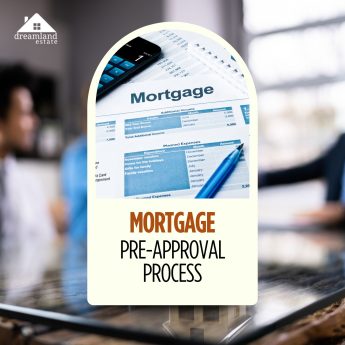









Leave A Reply